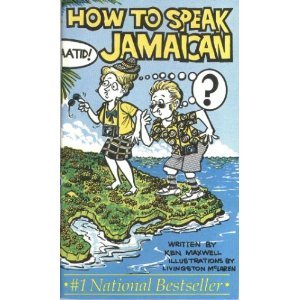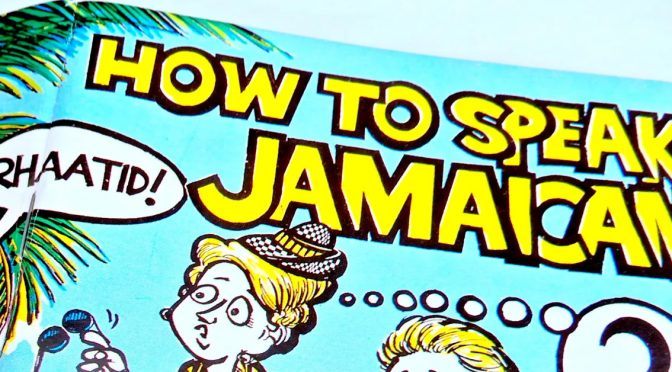 For those who have asked: Jamaica’s language is English. As a former British colony, the Jamaican political and educational system culture, habits, worldview, and social norms are influenced by British culture. (I believe my aunt in Kingston still has her 4pm cup of tea every day)
For those who have asked: Jamaica’s language is English. As a former British colony, the Jamaican political and educational system culture, habits, worldview, and social norms are influenced by British culture. (I believe my aunt in Kingston still has her 4pm cup of tea every day)
If you’ve visited Jamaica you might think otherwise, but trust me the local “patois” spoken in Jamaica is English, but it also has elements of European (British, Spanish, Portugese) African (Ghanaian, Ethiopian), and Asian (Chinese, Indian) languages thrown in because of the range of influences–colonial, captive and immigrant–that have passed through Jamaica, its people and history.
Patois is not a full-fledged language, per se, but shares many elements of a distinct language.
In much the same way that two speakers of a shared language can cloak themselves in a bubble of privacy in a foreign land, (while it may be considered a bit impolite to do so), two Jamaicans in the middle of a group of people who also speak English can do the same. If you, as a native English speaker are trying your best to eavesdrop on a conversation in patois, you will have an increasingly difficult time to follow because once the Jamaicans are aware you are listening in, they can dive deeper, speak faster, even use non verbal sounds (Jamaicans: think “kiss teet” ; others: stay tuned for audio and video) and other slang to avoid detection. The speed of delivery of patois, the choice of contractions, as well as the intention behind its use all affect how decipherable it is to non-native patois speakers.
Patois is associated with the average man, the common folk. Therefore, when someone of more elevated status in Jamaican society uses it, he or she is going back to basics, forging a bond with his audience based on the essence of Jamaicanness that unites all Jamaicans regardless of their individual social status.
When a person speaks in patois, she wants to let the listener know that this is something heartfelt. This is something serious stripped of the pretense, pomp and parade (and even duplicity) often associated with the Queen’s English. (mek mi tell yu someting weh come fram mi ‘art)
However, because patois IS essentially English, everyone in Jamaica understands it, and everyone in Jamaica speaks it to varying degrees of convincing authenticity. Jamaicans often joke that the unique thing about being a Jamaican educated in the Queen’s English, but speaking Jamaican patois is that “I can understand the English man, but ‘im cyah unnastan’ me!” (can’t understand me)
Those born and raised in Jamaica–or in Jamaican families abroad–understand both. It wouldn’t be unusual to hear a conversation between a common man and, say, a judge where the common man is speaking in full back-a-bush patois, while the judge is responding in the full parliamentary-style Queen’s English. Each understanding the other perfectly. And while practically everyone in Jamaica can understand and use patois, (although some of higher social circles may deny it and distance themselves from that fact), it isn’t considered “polite, hoity toity” language.
So, when you hear it in settings where the more standard English is called for, there is often an underlying humor associated with the choice to use patois. When I choose to use patois to make what should be a polite, sophisticated acceptance speech, for instance, there is a tongue-in-cheek aspect to it. It is not literally a “translation” into “Jamaican.” The underlying humor comes from the understanding–among Jamaicans–that I am also assuming a persona. And depending on my tone and inflections and choice of phraseology and syntax, I have “become” a common man, a country farmer, a market woman, a ganja herbsman, a Rasta Elder, grandma and grandpa, or the politically-opinionated man on the street who knows everything there is to know about Jamaican “politricks.”
So, with that said, there are elements of the humor of my acceptance speech which may elude your full grasp if you are not Jamaican. And for that I apologize as this is a blog for everyone. Learn the language, please. Keep up!
This is not a comprehensive treatise on Jamaican Patois. These are just a few thoughts I’ll probably amend at a later date. For more erudite essays on Jamaican culture and language, do a search for the works of Louise Bennet (Miss Lou in Jamaica), and also to hear the combination of Patois and English in recorded works, I’ll refer you to the works of “dub poets” Linton Kwesi Johnson, Mutabaruka and Oku Onuora.

